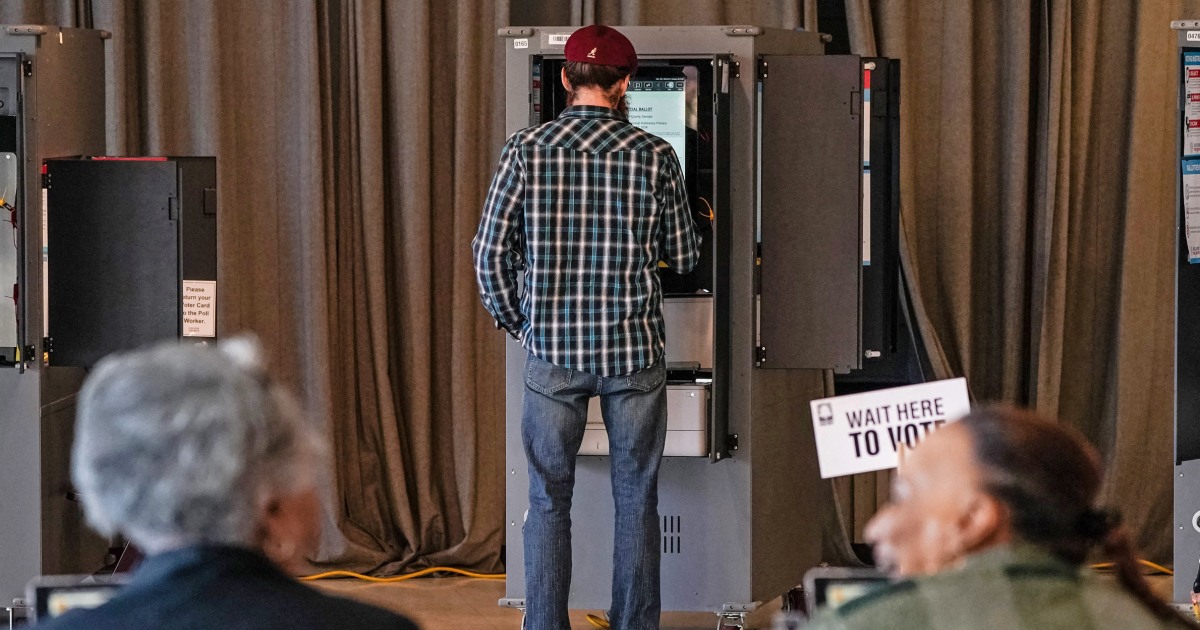
The GOP-controlled Georgia legislature on Thursday passed a wide-ranging elections measure that would expand access for candidates to appear on the state’s presidential ballot and would broaden abilities to challenge voter eligibility.
The House and Senate passed Senate Bill 189, which combined several previously separate election bills, sending it to Republican Gov. Brian Kemp’s desk. It was passed as the state’s two-year legislative session ended Friday.
The legislation could have immediate implications for the 2024 presidential election in the crucial battleground state.
Under the bill, any political party or political body could qualify for the presidential ballot if it already has gained access to the ballot in at least 20 states or territories.
The new provision could help independent candidate Robert F. Kennedy Jr., who is trying to appear on the ballot in all 50 states this November. He has so far only collected enough signatures to qualify on about a handful of ballots including Hawaii, Nevada, New Hampshire and Utah.
All of Georgia’s unhoused people will need to redo their voter registrations to comply with the law, too, as a provision in the bill requires those without a permanent address to register at the registrar’s office in the county where they reside. Previously, registered voters without permanent addresses have registered at shelters or government offices, including courthouses.
The bill also includes provisions that may make it easier for amateur voter fraud hunters to successfully challenge other voters’ registrations, by listing out details on what would substantiate the “probable cause” needed to uphold such a challenge.
Probable cause can now include an elector being registered at a nonresidential address as confirmed or listed by or in a government office, database, website, or publicly available sources derived solely from such government sources. A voter’s appearance in the USPS change-of-address database is not evidence alone of a voter’s ineligibility, the law notes, but could be used to help substantiate a challenge.
In 2021, Georgia lawmakers encouraged amateur voter fraud hunters by writing into the election code that residents could make an unlimited number of challenges. Since then, a handful of individuals have challenged tens of thousands of voter registrations, overwhelming election officials with research. One man developed a database, Eagle AI, that amateur fraud hunters pore over the voter rolls and search for potentially ineligible voters, like people registered at nonresidential buildings.
America’s voter rolls are built for registration, not removal, which means they may often include outdated voter registrations. Election officials have years-long procedures for removing outdated voter registrations, too. And while there’s no evidence that bloated voter rolls lead to fraud, officials and election experts warn that amateur fraud hunters may use discriminatory strategies to search for voters or that inaccurate data or typos might knock eligible voters off the roles.
“These mass voter challenges time and again disproportionately try and throw Black and Brown voters off the rolls. They have been a strategy for a long time to have a chilling effect on voting,” said Lauren Groh-Wargo, interim CEO of Fair Fight Action.
Republicans, she said, are “looking for opportunities to shave off the votes of folks who are likely to vote for Democrat.”
State Rep. Al Williams, a Democrat, said the bill was designed to suppress voters of color, and part of the “foolishness” he fought against during the Civil Rights Movement.
“It’s straight out the old playbook of a nationally-coordinated right-wing effort to just make access to the ballot impossible,” he said.
Republicans defended the bill in the legislature, arguing it will improve voter rolls.
State Rep. John LaHood, a Republican, said the bill increases confidence in elections.
“What this bill does is ensure that your legal vote does matter,” he said.
Lawmakers also wrapped in proposals that would remove the secretary of state from Georgia’s election board, ban QR codes on voter ballots in future elections and require counties to report absentee ballot votes within one hour of polls closing.
The ACLU said in a statement Friday that it “strongly opposes this bill,” vowing to sue the governor if he signs the measure into law.
“Access to the ballot is at the heart of our democracy,” said ACLU of Georgia executive director Andrea Young. “This election ‘Frankenbill’ violates the National Voter Registration Act. We are committed to protecting Georgia voters. If the governor signs this bill, we will see him in court.”
Georgia Republicans have worked to pass new election rules in the wake of former President Donald Trump’s 2020 presidential election loss to Joe Biden.
Trump and his supporters have repeatedly blamed voter fraud for his loss. Their efforts to challenge the election results in Georgia led to the criminal case against him and over a dozen co-defendants.
Fulton County District Attorney Fani Willis charged Trump and his co-defendants last year with violating Georgia’s RICO (Racketeer Influenced and Corrupt Organization) Act.
A trial date has not yet been set in the case, though Willis has made clear she’s interested in an August start date.
Source: | This article originally belongs to Nbcnews.com









